Poor
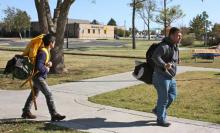
NORMAN, Okla. — Pastor Dustin Buff traded in his job, his house and his sense of security for a backpack, a Bible, a sleeping bag, one change of clothes, identification, and a cell phone.
For 10 days, Buff and youth minister Philip Nguyen were intentionally homeless, wandering the streets of Norman in a personal quest to understand the plight of the homeless.
Andrews Park, a mile and a half from the University of Oklahoma, is a temporary home to many of the city's homeless. Buff estimates 300 people live on the street in this city of 113,000. In the park, the homeless gather in gazebos, sleep in faux forts on the playground, and lounge on the steps of the amphitheater.
Buff pointed to the municipal buildings that ring Andrews Park.
“All the city offices are right there,” he said. “Homeless people are sleeping here at night right across the street from the police station. I’ve read government estimates that Norman has 1,700 homeless residents, if you include transient housing, shelters, and the streets.”
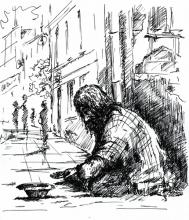
Is poverty what it used to be? Or has poverty grown so shameful that we dare not speak its name? So determined are we keep poverty out of view, we erase the presence of the poor from Jesus’ teachings. The widow we encounter in Mark 12:38-44 provides a case study in poverty and oppression. Unable to confront poverty, we have turned her into something safer – an example of generosity.
The election has just passed. As I’m writing this, I don’t know who will win. I do know this: neither presidential candidate could work up the courage to address poverty as a serious issue, at least not directly. If Democrats typically look out for the poor, you wouldn’t know it from President Obama; Mitt Romney mentioned the poor more often than did the president, if only to remind voters that the economy is struggling. For his part, Obama avoided the “p-word,” even if he discussed policies that could remedy the poverty problem. Some of our political leaders do include the poor in their policy work, but they face an uphill struggle.
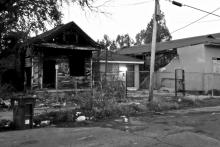
Much has been said by politicians and the press in this campaign. In three presidential debates alone, we've heard the two contenders for our nation's highest office speak of tax cuts, deficits, jobs, and the middle class literally hundreds of times.
But much has also been left unsaid. In those same presidential debates, poverty was hardly featured and the word "inequality"didn't appear at all.
How can it be that the Holy Bible refers to helping the poor and vulnerable more than 2,000 times, yet two professing Christians running for president of the United States disregard this unholy scourge?
As we did not hear in the debates, nearly 50 million Americans are currently living in poverty – more than at any other time in our nation's history – and between a third and half of all Americans are within a few lost paychecks of the poverty line. When a quarter of all American jobs pay less than poverty line wages for a family of four, systemic poverty and inequality become more than abstract economics: they are moral and Constitutional concerns.
So they should be treated by the men and women who aspire to lead our country.
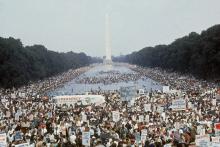
In early 1968, Martin Luther King, Jr., and other civil rights leaders continued plans for a Poor People’s Campaign. It would take place in the spring in Washington, D.C. The poor and those in solidarity with them would take up temporary residence and march peacefully on the Capitol and advocate for substantial anti-poverty legislation from Congress. They would demand jobs, healthcare, and decent housing.
People set up a camp on the Washington Mall and called it Resurrection City. Jesse Jackson gave his famous "I Am Somebody" speech there. But King was assassinated in the weeks leading up to the campaign and Robert Kennedy was assassinated during it. Disheartened and discouraged, people drifted away from the campaign, their dreams deferred.
What if MLK had lived to lead the campaign with his insight and eloquence? What if Bobby Kennedy had lived to support it with his doggedness and political will? Would the United States be a place where 1 out of 5 children, around 15.5 million, are in poverty and where close to 50 million people are without health insurance?
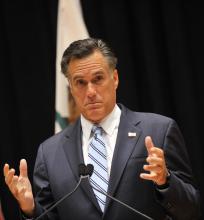
The recently revealed video of Gov. Mitt Romney at a fundraising event last May is changing the election conversation. I hope it does, but at an even deeper level than the responses so far.
There are certainly politics there, some necessary factual corrections, and some very deep ironies. But underneath it all is a fundamental question of what our spiritual obligations to one another and, for me, what Jesus' ethic of how to treat our neighbors means for the common good.
Many are speaking to the political implications of Romney's comments, his response, and what electoral implications all this might have. As a religious leader of a non-profit faith-based organization, I will leave election talk to others.
As the faith leaders said yesterday, we have no choice but to respond when we learn that so many of our brothers and sisters are living in poverty. It makes these presidential candidate videos ones that every Christian should watch before they vote.
We asked the candidates, what will you do to address the highest numbers of people in poverty in America in almost 50 years—numbers that we learned today are still growing? We believe these messages from the Presidential candidates should lift the issues of poverty into the national debate into this election season.
We invite members of the press to watch these videos and to question these candidates even further about their visions and policy choices for overcoming poverty. The poverty numbers that came out yesterday require responsible journalists to make the question of poverty an important part of this election year discussion.
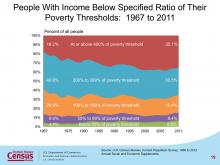
The U.S. Census Bureau released its 2011 poverty report this morning, reporting that 46.2 million people were living in poverty, amounting to 15 percent of the population. Neither was significantly different than 2010. All major demographic categories – white, African-American, Hispanic, Asian – were also essentially the same as last year.
The number of children and the elderly in poverty remained the same.
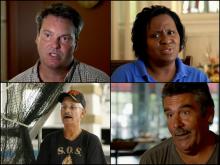
Matthew 25 doesn’t say, “As you have done to the middle class you have done to me."
What it records Jesus saying is, “As you have done to the least of these, you have done to me.” Chances are that will never be the central message of political conventions during election years.
But every four years for the last 40 years (even before we were called Sojourners), our community has done what we can to lift up the issue of poverty during presidential elections. While political party platforms have changed, our commitment to the least of these has not.
So it is with that spirit, this election year, that I am proud to present a new short film called The Line.
Written and directed by Emmy-award winning producer Linda Midgett, it chronicles the very real stories of four real people struggling with real poverty in America today.
You’ll meet a banker in the suburban Midwest who used to earn six-figures a year and now, after the economic collapse, must go to a food bank to feed his three kids; a fisherman on the Gulf Coast of Louisiana who has watched his livelihood and his culture wash away in the wake of Hurricane Katrina and a devastating off-shore oil spill; a blue collar guy in North Carolina who worked hard his whole life but lost his job, became homeless, and started over as a restaurant bus boy; and a single mom in Chicago who battles daily to ensure that her son is safe, healthy, and has the opportunity to go to college.
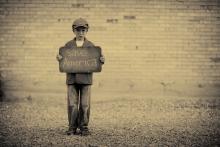
I’ll be honest … I’m a coward. During the political season I find myself avoiding certain conversations that I do care about. Mind you, I do have opinions. My wife would say I have an opinion on everything. Faith and social issues are extremely important to me, and I have spent a lot of years studying and following the trends and their impact on people I care a lot about. I am especially focused on issues that affect the poor, mentally ill, unemployed, addicted, and homeless. Topics of Medicare, unemployment benefits, the death penalty, gun control, abortion, gay marriage, state and federal budget and deficits, immigration, and foreign policy all matter to me. I do have opinions! (And I vote!)
Yet during the final months of America’s presidential street fight, I tend to lay low. I know that one simple conversation with almost anyone can turn volatile and unleash the beast within them. If educated congressmen, presidential candidates, governors, and even local representatives can be as nasty and polarized as they have publicly shown, there is little reason to honestly discuss an issue, since the potential for alienation and misrepresentation is at an all-time high. No one seems to be listening, having crystallized their presuppositions with a crafty skill of spinning any topic into their agenda. Ironically, our children are watching adult leaders model behavior we wouldn’t let them get away with.
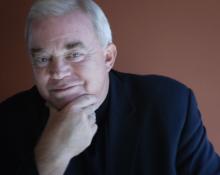
There is hardly a more controversial political battle in America today than that around the role of government. The ideological sides have lined up, and the arguments rage about the size of government: how big, how small should it be? Some famously have said government should be shrunk so small that it "could be drowned in a bathtub."
But I want to suggest that what size the government should be is the wrong question. A more useful discussion would be about the purposes of government and whether ours is fulfilling them. So let's look at what the Bible says.
The words of Paul in the 13th chapter of Romans are perhaps the most extensive teaching in the New Testament about the role and purposes of government. Paul says those purposes are twofold: to restrain evil by punishing evildoers and to serve peace and orderly conduct by rewarding good behavior. Civil authority is designed to be "God's servant for your good" (13:4). Today we might say "the common good" is to be the focus and goal of government.
So the purpose of government, according to Paul, is to protect and promote. Protect from the evil and promote the good, and we are even instructed to pay taxes for those purposes. So to disparage government per se — to see government as the central problem in society — is simply not a biblical position.
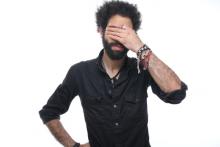
Maybe the serpent in the Garden of Eden story actually was a cute little girl in pigtails. Sure would have been more persuasive than some stupid talking snake.
Explaining to kids who have grown up their entire lives with such privilege is almost like trying to translate a foreign language for them. No, not everyone just goes in and grabs whatever they feel like from the fridge or the shelves. They don’t order in when they’re too tired or lazy to cook, and they don’t mark every mundane occurrence in their lives with a celebratory dinner out. It’s normal to them, but that doesn’t mean it’s normal.

“So what are food stamps anyway?” my 8-year-old son, Mattias, asked as I drove him to his summer camp this morning. “Are they, like, stamps that you eat that taste like different foods?”
“Not exactly,” I said.
My family was less than thrilled when I presented the idea of living on the equivalent of what a family of four would receive on food stamps for a week. Actually, the program is now called “SNAP,” which stands for “Supplemental Nutrition Assistance Program,” and involves government-issued vouchers or debit cards, rather than the antiquated stamp method. But the result is the same; we have a lot less to spend on food this week than usual.
“But I don’t want to be poor,” Mattias moaned as I explained the challenge to him.
“We’re not poor,” I said, “but it’s important for us to know what it’s like to struggle to feed our family.”
“Why?”
“Because,” I paused, trying to figure out a way to explain privilege and compassion to a third-grader who was quite content to have all he has, and then some, “Jesus tells us to have a heart for the poor, but how can we really do that if we don’t know anything about what it’s like to live with less?”
“Hmm,” he wrinkled his brow, “I guess we can do it for a few days.”

Editor's Note: The following remarks were given on Capitol Hill on Aug. 1 as part of a call from faith leaders across the religious spectrum urging Congress to extend the Earned Income Tax Credit and Child Tax Credit for low- and moderate-income Americans.
A budget is a moral document. That phrase was coined by the faith community and has become a refrain in the ongoing debates over deficits and budgets. But in this week’s House vote on extending the Bush era tax cuts, we see one more example of the priorities and principles of the broader GOP budget and how they apply to the rich and to the poor. Because of this, we must conclude that the Republican budget is an immoral document—in the way it treats the poor. I certainly don’t believe that all our Republican lawmakers came to Washington to hurt poor people, but it’s time for some of them to challenge the dominant forces in their party and face the consequences of such indefensible choices.
We have a genuine hope for a long term bi-partisan solution and, in particular, a moral non-partisan commitment to protect the poor and vulnerable from being expendable in these fiscal debates. We should also say that Democratic budgets have not been models of fiscal responsibility and social justice, either. But what the House budget is calling for is morally objectionable on religious and biblical grounds—and people of faith from all political stripes should say so. In particular, to roll back tax credits for the poor to help fund tax breaks for the rich is morally reprehensible, and the faith community has to speak out.
Chris Hedges has a fascinating piece for Salon on the betrayal of the most vulnerable by war:
"We condition the poor and the working class to go to war. We promise them honor, status, glory, and adventure. We promise boys they will become men. We hold these promises up against the dead-end jobs of small-town life, the financial dislocations, credit card debt, bad marriages, lack of health insurance, and dread of unemployment. The military is the call of the Sirens, the enticement that has for generations seduced young Americans working in fast food restaurants or behind the counters of Walmarts to fight and die for war profiteers and elites.
The poor embrace the military because every other cul-de-sac in their lives breaks their spirit and their dignity. Pick up Erich Maria Remarque’sAll Quiet on the Western Front or James Jones’s From Here to Eternity. Read Henry IV. Turn to the Iliad. The allure of combat is a trap, a ploy, an old, dirty game of deception in which the powerful, who do not go to war, promise a mirage to those who do."
Read the full article here

In the name of protecting the “middle class” some politicians have been pressing for extensions of the Bush Tax Cuts for all earnings up to $1 million. They are calling folks in the top 1 percent “middle class.” This week, President Obama announced that he would extend the Bush era tax cuts for all earnings up to $250,000, but not beyond this threshold. Still hard to swallow the idea of those being “middle class” tax breaks but it’s an improvement from calling millionaires “middle class.”
While Jesus loves everybody, there is no Christian tradition of teaching God’s “preferential option for the middle class.” For Christians, it’s still about the poorest and most vulnerable, and here is why these tax issues matter to those Jesus called “the least of these.”

Sister Kathy Long turned toward my 13-year-old daughter and asked one question: “What will you tell your friends about spending this month in Mexico?”
In a public park in Cuernavaca, Mexico, we sat on a concrete bench next to six women who chatted and stitched embroidery patterns with brightly colored thread.
I glanced toward the sewing group, realizing that Maya would have rolled her eyes if I had asked her that same question. An intrusive query from a mother seemed compelling coming from a Catholic nun who worked in Mexico, promoted justice amid poverty, and even spent three months in jail for protesting the military training of Latin American leaders in the U.S.
“I will tell them that rich people and poor people are all people in the end,” Maya responded. “If you have three cars and two houses, you are a person just like someone whose house is made of cardboard or metal.”
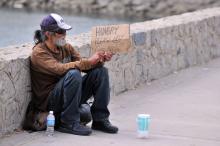
A growing number of cities across the United States are making it harder to be homeless.
Philadelphia recently banned outdoor feeding of people in city parks. Denver has begun enforcing a ban on eating and sleeping on property without permission. And this month, lawmakers in Ashland, Ore., will consider strengthening the town's ban on camping and making noise in public.
And the list goes on: Atlanta, Phoenix, San Diego, Los Angeles, Miami, Oklahoma City and more than 50 other cities have previously adopted some kind of anti-camping or anti-food-sharing laws, according to the National Law Center on Homelessness & Poverty.

“Middle class” is the chemical weapon of political warfare. We know applying the “middle class” label broadly works and can help us win in the short term. But those victories come at a cost to who we are … and tend to result in long-term (and not insignificant) casualties for those we are supposedly fighting to defend.
Republicans are the Party of the Rich. Democrats now fashion themselves the Party of the “Middle Class.” Can anyone think of a group left with no champion? Here’s a hint: 20 percent of Americans with a full-time job are getting paid so little that--even with both parents working full time—their family of four is still living in poverty. But when’s the last time you heard a Democratic politician even mention the word “poor?"
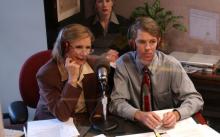
Those who wish the see the wall of separation between church and state burned down have a rather colorful – if not exactly truthful – spokesperson on their side these days. Evangelical preacher, founder of “WallBuilders Live” and perennial headline grabber David Barton is known for his “out there” claims, but his most recent is a keeper.
Barton is fairly well known for his argument that the notion of separation of church and state is a myth. He, like many fellow conservative Christians, believe that the United States was founded as a Christian nation, and that our founding father intended for this to be a country governed by Christian values, if not specifically Christian leaders.
This, by itself, is not particularly outrageous, at least in the sense that his views are not unique to him. But one of the foundational claims he makes to support his advocacy for Christian nation status is his claim that the Constitution of the United States quotes directly from the Bible.
Come again?
CBS reported yesterday:
Illinois hospitals would be required to provide free surgeries and other inpatient care to many uninsured poor people under a bill the Legislature passed Tuesday, a mandate already on the books in eight other states.